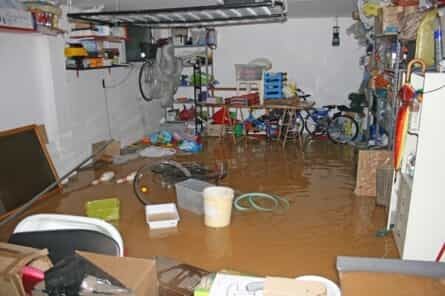Wastewater exposure is one of the most dangerous hazards to your property. The water in your sewage system may contain a number of dangerous diseases, including Gastroenteritis, Cholera, Leptospirosis, hepatitis A, Legionellosis, as well as various other skin and eye infections. And even if you don’t come in contact with sewer water directly, the pathogens from waste can enter your lungs, so prolonged exposure is still extremely dangerous. And this is to say nothing of the damage a sewage leak can cause to your property.
At FP Property Restoration, our water damage experts proudly provide sewage cleanup to help make sure your home is safe and clean as soon as possible. The important thing is to act quickly if sewer water enters your property, and to take the necessary steps to protect your home and your family. Keep reading for more on what to do after a sewage backup, and remember that for all your emergency water damage needs, FP Property Restoration is available 24/7.
Steps to Take After Your Home Experiences a Sewage Backup
- Clean Yourself Properly: Cleaning and disinfecting your body with proper first aid, antibacterial soaps, and antibacterial hand wipes is extremely important if you have been exposed to sewage water, or even come near it. This goes double if you have any open wounds, as wastewater entering your skin this way can be deadly.
- Watch Out for Major Injuries: If someone in your family has an injury that has been exposed to raw sewage, or has come in direct contact with wastewater, you should immediately take them to the hospital. Even a small cut can turn into a major injury in this situation, so do not hesitate to act right away.
- Avoid Touching Your Face: Even after you have washed your hands, it is still best to avoid touching your face if you have been exposed to wastewater. You don’t know how many germs are lingering, even if you have scrubbed thoroughly, and the last thing you want is any hidden pathogens entering your nose, mouth, eyes, or ears.
- Keep Washing Your Hands Throughout the Day: Think of the 24 hours or so following wastewater exposure the same way you would think about trying to avoid a virus. Assuming that you have been exposed to sewer viruses is safer than going about your day as normal— touching everything and potentially spreading dangerous pathogens.
- Assess the Damage: Once you have taken care of any risks to your family, you can begin to assess the damage to your property. Try to record anything that might have been exposed to sewage water. If there is even a chance an item has come in contact with waste, it is best to assume that it needs to be cleaned or disposed of.
- Find a Place to Stay: Staying somewhere that has recently been exposed to sewer water is unsafe for everyone in your family. Even if the backup only affected one room of your house, it may still be a good idea to find a place to stay the night, until the wastewater damage can be thoroughly cleaned up. Speaking of which…
- Call a Professional: Once you have done everything you can to take care of your family and your home, it is time to let the professionals step in. At FP Property Restoration, our licensed team can clean up sewage water quickly and thoroughly, and make sure your property has not experienced structural damage that could come back to bite you in the future. We’ll also work with your insurance company to help you receive full compensation, and with packout and storage service for your most cherished belongings, FP Property Restoration is here to ensure your property is always in good hands.
To schedule an appointment, call (888) 408-2335, or send us a message online.


